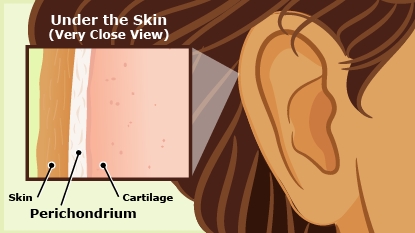Perichondritis of the Ear: How to Care for Your Child
Perichondritis of the ear is an infection of the skin and tissue around the cartilage of the outer ear. Treating it helps to prevent the infection from spreading to the cartilage and reduces the chance of damage to the ear.


Perichondritis is an infection of the perichondrium, a layer of tissue around the cartilage in the stiff part of the outer (visible) ear. The ear may be painful, swollen, and red. Sometimes there is a collection of pus, called an abscess. The earlobe is usually fine.
Perichondritis usually happens after an injury to the ear, such as with ear piercing, surgery, a blow during contact sports, a burn, a cut, acupuncture, or an insect bite.
Perichondritis can quickly spread to the cartilage, causing damage to the appearance of the ear, so it's important to treat it as soon as possible. Health care providers treat this condition with antibiotics. The antibiotics may be given by mouth or into a vein. Some kids with perichondritis also have surgery to remove dead tissue and drain any pus that has collected.

-
Give your child any prescribed medicine as directed by the health care provider.
-
Keep the outside of the ear clean. If your child has a dressing, leave it in place unless your health care provider has given you instructions on how to remove or change it.
-
Your child should not wear any earrings in the infected ear until the health care provider gives the OK.


-
Symptoms continue or worsen.
-
Symptoms improve and then worsen again.
-
Your child gets a fever.
-
Pus or blood drains from the ear.

Your child:
-
Has increasing or severe pain.
-
Looks sicker.
-
Develops new symptoms like trouble swallowing, weakness of the face, hearing loss, hoarseness, or a stiff neck.